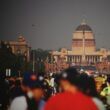Yes, science is being distorted. But, much more dangerous, it is being rejected.
By Robert Socolow, October 20, 2011
This roundtable explores “the proper scientific response to the political distortions of science.” Indeed, distortions abound regarding both what science understands and how science is conducted. Of even greater concern, however, is the rejection of the scientific way of knowing — or rather its relegation to the status of just one of many equally valid ways of knowing. If the scientific method loses its place as a privileged way of knowing, the consequences will be devastating. Developing effective responses to the rejection of science, however, will take scientists into unfamiliar territory.
Distortion. The scientific enterprise encompasses both what is understood about the natural world and a set of professional norms. Both can be distorted, out of ignorance and deliberately.
In America’s litigious society, the scientific enterprise is enmeshed in conflict. Science is used selectively by those seeking to influence legislation. The scientist-as-expert-witness is hired to persuade juries. Sometimes the conflict centers on whether a glass is half full or half empty: The same fact is looked at two different ways. Sometimes how well something is known is debated. It is hardly surprising that there is so much misunderstanding about both what science has learned and how science is conducted.
With a free press and unrestricted access to decision-makers, the open society is supposed to limit the adverse consequences of such legitimated distortions of science. To provide those checks and balances, the open society must be protected. The best way forward is to shore up our democracy — no small task when the funding of politics is skewed by corporate personhood and the cogency of the media is undermined by the leveling effects of the internet.
Rejection. More threatening than the distortion of science, however, is its rejection. At issue is whether the scientific way of knowing is privileged relative to other ways of knowing that are rooted in myth. As scientists, we are poorly prepared to respond when science is called “just a theory,” on a par with other theories. We are distressed when intelligent design and evolution are placed on the same footing. We consider it self-evident that better climate science will help in sorting out threats to human well-being from climate change. Then we learn that the answer is already known: Our vulnerability is minimal because God wouldn’t let climate change injure us.
Think hard about Republican presidential candidate and Texas Gov. Rick Perry’s mental model, which leads him to reject climate science and cast himself as Galileo and the current science establishment as the 17th century Catholic Church. Rather than writing him off, perhaps scientists should consider this stagecraft to be a warning. Perhaps an experienced politician knows something about the state of the electorate that scientists should not dismiss. What are the similarities between the current scientific enterprise and the 17th century papacy? We scientists are remote, we believe we deserve deference, and we extract considerable financial resources from the general population to run our affairs. Such parallels make us vulnerable.
We must not underestimate the threat now looming. Another age of darkness could lie ahead. In what may someday be called the Science Wars, our opponents present science as dogma and construct a symmetric conflict: their dogma vs. our dogma. We are carried back to the contest set up by Elijah to determine the stronger god, described in the Book of Kings. Firewood is piled on two altars on the peak of Mount Carmel, and each group pleads with its god to create a fire. “Baal, we cry to thee” is a poignant moment in Mendelssohn’s rendition.
There is no such symmetry. Science is not just another point of view. Science is a process of searching, always incomplete. Its norms include strict evidentiary standards and transparency. Anyone working anywhere can overturn a prior consensus. Safeguards against human frailty take the form of countless processes that protect decision-making from being compromised by friendship, rivalry, and financial interest.
To counter the rejection of science, perhaps it will be productive for scientists to assure that these long-tested and distinctive norms are widely appreciated. Science is usually defended differently. One strategy is to justify science through its utility — its role in bringing about the healthier and fuller lives that nearly all of us live. A second is to appeal to the elegance of the edifice of science and its capacity to make sense of both our past and our place in the universe. Arguing for science by explaining its governing rules is, in effect, opening a third front.
In summary, to refute distortion we must first understand that distortion is often animated by rejection. And to counter rejection, we must retain — or perhaps regain — the public’s trust. We must earn the moral high ground: No longer can we assume that others will place us there.
The time on the Bulletin‘s Doomsday Clock would need to be advanced at least two minutes toward midnight if the scientific method were to lose its primacy, even if, in the short run, nothing else changed.
Topics: Climate Change
Share: [addthis tool="addthis_inline_share_toolbox"]














